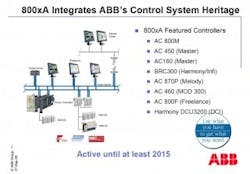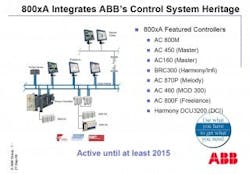Mark Taft then took the floor again to talk about "automation lifecycle management" saying "we really haven't focused on the automation assets themselves."
He also tried to set the record straight on ABB's support policies. For many years, during ABB's problems with absorbing their engulfed companies, their competitors could and did sow Fear, Uncertainty and Doubt about whether or not ABB would support "Legacy" (read, abandoned) products, and in fact, if ABB would be around itself to do it.
Now that the hoorah has died down, it seems to ABB to be a good time to restate their support policy:
There are four classes of hardware (this is a relatively hardware centric policy): Active, "Classic," "Limited" and Obsolete.
This path from new to dead is good for 10 years. On the software side, they are offering a subscription maintenance program that even includes MS security patches and testing for up to 7 years. On the controller level, the life expectancy of controllers might well be 15 to 20 years, and as the graphic shows, they're still supporting a large number of "legacy" controllers and will be doing so through 2015 for the ones listed here. And on the field level, they are producing prior generation I/O connectivity.
"With increasing business challenges," Taft said, "it isn't possible for many customers to shut down and reconfigure in order to upgrade their automation systems. They can't interrupt, they have 24/7 operations, and there are validation and training issues involved. So we call this 'evolution' not 'migration.' Migration," he went on,"has always meant to me, 'rip and replace' and that's not what we want to do. We want to switch out incrementally for our customers, not rip and replace." Taft continued, "Successful evolution involves planning, listening to customers." Incremental upgrades, he noted, are much easier to budget, and for the end user, they are better than an "all or nothing proposition."
System 800xA evolution deliverables include:
Console functionality:
--graphic display conversions
--consistent look and feel to original environment
Connecting new i/o
Adding new applications
--asset optimization
--historian functions
Batch functionality
Control and Engineering tools options (not yet released)
Then Taft went through a list of customers who have done interesting "evolutions."
Erachem Comilog, US
--Infi90 to 800xA, now downtime, kept the controllers to upgrade them later
Celulosa Argentina paper mill
--Advant Master to 800xA
OMV Ag Austria
--Customer did the upgrade themselves, loop by loop from a Contronic P to 800xA
Bayer US- Berkeley CA
--upgrade of a MOD300 to 800xA
This written lifecycle policy, says Taft, "gives the customers plenty of runway to plan their evolution."
Taft went on at length about "Flawless Project Execution" and ABB's process for same. Basically, he laid out a very well thought out process that maps to any size process automation project, but said that ABB would only be able to do the very biggest ones because of overhead and costs. Like every other automation supplier, ABB wants to be in the EPC business, or at least the MIC or MAC or main electrical and instrumentation vendor slots of it.
About the Author
waltboyes
waltboyes
Sign up for our eNewsletters
Get the latest news and updates

Leaders relevant to this article:

